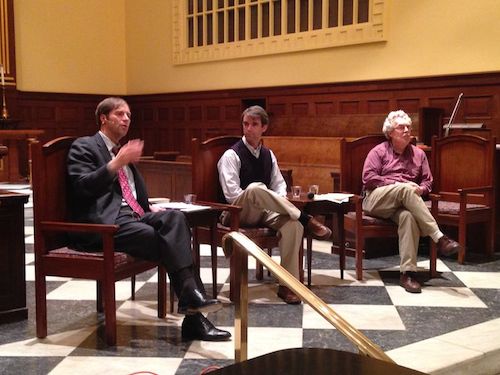 Evolution
Evolution
 Intelligent Design
Intelligent Design
"Should Christians Embrace Darwin?" An Evening with Karl Giberson and Stephen Meyer

I’m just back from a busy speaking trip with Stephen Meyer and thought I would give a quick recap of one event, in Richmond, Virginia — a public discussion with noted theistic evolutionist Karl Giberson.
The debate was held at a study center near the University of Richmond, in a pleasant neighborhood of the city. About four hundred people turned out to hear Karl and Steve address the question “Should Christians Embrace Darwin?” Karl won the coin toss and went first. I quickly realized that he was making much the same presentation he did in a 2009 event with Discovery Institute’s John West at Biola University.
Where was the new evidence? Where were the cutting-edge studies supportive of his view? Not there. What was in his PowerPoint presentation was a bunch of pictures — characters from The Simpsons, a baby with a tail, webbed feet, a strange-looking whale creature with legs, and a pretty picture taken at his vacation home the other weekend. Just comparing his PowerPoint to Meyer’s was revealing. Meyer’s presentation was sleek, professional, and chock-full of scientific evidence and data.
Giberson spent most of his thirty-minute opening detailing the “evidence” for common ancestry and the problem of “bad design.” He also questioned whether intelligent design may properly be termed a theory, as he thinks it doesn’t meet certain minimum requirements, nor does it present the type of “evidence” he would consider valuable or trustworthy: “There is no evidence for intelligent design because the theoretical framework that transforms the data into a theory is not there.” He admitted he’d be a lot more attracted to ID if it developed into a theory along the lines of the second law of thermodynamics, with comparable mathematical precision and practical applications, and if ID “changed [the dominant] way of explaining things.”
Meyer used his opening statement to frame the debate. This isn’t about embracing Darwin, he explained. It’s about embracing Darwinism, and why should we do that if it’s a dying theory that doesn’t in fact have the creative power attributed to it?
Steve clarified the several definitions of evolution and put common descent to one side as a “secondary argument” and not the focus of the debate. Then he described some problems with neo-Darwinian theory. He told about Francis Crick’s revelation to biology in the 20th century and presented the origin of biological information as the central mystery to be explained. He discussed the combinatorial problem for the selection/mutation mechanism, sharing Douglas Axe’s work on the rarity of functional proteins in sequence space. He explained epigenetic information — the information beyond DNA and stored in cell structures — that plays a crucial role in the formation of animal body plans.
His point was that neither Christians nor anyone else needs to feel obliged to get on board with Darwinian evolution. That’s not for theological reasons, but because, simply as a matter of science, it’s a sinking ship.
Giberson used his response time to assert that the fossil record is what, under the Darwinian perspective, we’d expect to see. He dissed DNA as “sloppy, wasteful, and disorganized” and tried to downplay the design patterns evident in nature. Meyer replied by presenting a short positive case for ID, explaining how we use Darwin’s own method of historical reasoning to arrive at a distinctly non-Darwinian conclusion. By the end of the “friendly discussion,” it was clear that Meyer held the scientific high ground.
A few interesting questions came up in the Q&A afterward. One audience member asked both speakers how they thought life began. Giberson was frank in saying he doesn’t find any presently available explanation satisfactory. At some point, someone will find the answer, he mused. Meyer suggested making an inference to the best explanation, given what we do know about the origin of information.
Someone else asked Giberson to give an example of a beneficial mutation. Giberson couldn’t come up with one, and you could hardly blame him for this. As Meyer put it, the kind of mutations we need we don’t get, and the kind of mutations we get we don’t need. When asked how long it takes for a theory to be rejected, Giberson’s answer was telling. “Theories remain as long as they’re the best game in town. If ID becomes a mathematically rigorous theory, I would be very interested in that. “
Giberson, to his credit, was amiable and courteous. He’s no rabid Darwinist. He’s not afraid to admit when he doesn’t know something. And he has made it clear that he is open to the arguments of intelligent design.
The event was classified by the organizers as more of a friendly discussion than a formal debate. But for all intents and purposes, a debate is what it was. If there had to be a winner, it was Meyer.
Oh, and the audience won too. Theistic evolutionists have confused and misled a lot of people. The point needs to be made at events with them that Christians and non-Christians alike should be careful about supporting a theory that the scientific community itself is in the process of rejecting.
